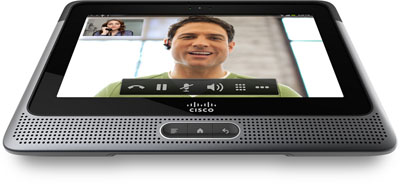Cisco Debuts Android-Based Tablet
Cisco Systems is the latest vendor to enter the tablet device market and, like other players, the company is looking at its entry as an alternative to traditional Windows-based PCs.
The Cius, announced this week, is a device that to some degree looks like Apple's iPad, though it is based on Google's Android platform. Cisco becomes the second major vendor to launch an Android-based tablet in as many months: Dell in late May launched the Streak. With its 5-inch display, it was described by Dell as a hybrid smartphone and tablet.
But that's where the similarities end. Cisco's Cuis is clearly targeted at professional, not consumer use. It will support an optional docking station, enabling individuals to mount it to the IP-based handset.

|
|
Look for Cisco to release the Cius early next year for less than $1,000.
|
|
When undocked, the Cuis can connect to an enterprise network or the Internet via 802.11 a/b/g/n WiFi or 3G cellular services. Ultimately it will support 4G services as they become more broadly available, Cisco said. Through Bluetooth and USB communications, the device will be able to share data with a PC, Cisco said.
The Cius is not slated to be available until the first quarter of next year, though Cisco said customer trials will begin in the third quarter of this year, which begins July 1. The company has not set pricing though a spokeswoman said it will carry a street price of less than $1,000.
Cisco is pitching the Cius as a virtual desktop that will allow for data collaboration and communication. It will support real-time HD video, messaging, and Web browsing, allowing users to share content in cloud-based services, Cisco said.
Weighing slightly more than 1 pound, it will have a front-mounted 720p camera and a 5 megapixel rear-mounted camera, dual noise-cancelling microphones, and a 7-inch Super VGA display.
The Cius will be designed to cork with Cisco's various lines of collaboration products and services, including WebEx Connect, Cisco Presence, and its high-end TelePresence videoconferencing systems.
Cisco said it will also reach out to developers with an SDK that includes its Collaboration APIs. The Cius will be made available through Cisco's network of Unified Communications and Collaboration partners, according to the spokeswoman.
About the Author
Jeffrey Schwartz is editor of Redmond magazine and also covers cloud computing for Virtualization Review's Cloud Report. In addition, he writes the Channeling the Cloud column for Redmond Channel Partner. Follow him on Twitter @JeffreySchwartz.